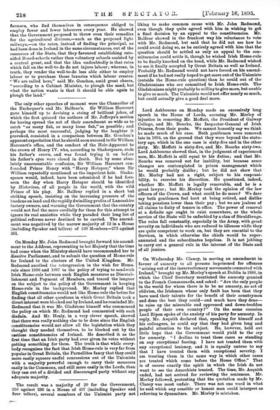On Wednesday Mr. Clancy, in moving an amendment in favour
of amnesty to all persons imprisoned for offences "arising out of the insurrectionary movements connected with Ireland," brought up Mr. Morley's speech at Dublin in 1888, in which the Chief Secretary mentioned the amnesty granted to the French Communards, and asked : "Are the only people in the world for whom there is to be no amnesty, no act of oblivion, the Irishmen whose only fault has been that they have used their talents for the benefit of their countrymen and done the best they could—and much have they done— to raise up the miserable and oppressed and down-trodden people of their own country ?" On the same occasion Lord Ripon spoke of the anxiety of his party for amnesty. In reply, Mr. Asquith declared that, speaking for himself and his colleagues, he could say that they had given long and painful attention to the subject. He, however, held out little hope that the Government would yield to the cry for amnesty. "I decline to treat these cases as standing on any exceptional footing. I have not treated them with any exceptional leniency, and it is equally untrue to say that I have treated them with exceptional severity. I am treating them in the same way in which other cases are treated which come before the Home Office." That is of course exactly the spirit in which the Irish do not want to see the Anarchists treated. The time, Mr. Asquith ended, had not arrived for reviewing the sentences. Mr. Morley followed, protesting that the quotation made by Mr. Clancy was most unfair. There was not one word in what he said which any sensible or honest man could interpret as referring to dynamiters. Mr. Morley is mistaken.


































 Previous page
Previous page